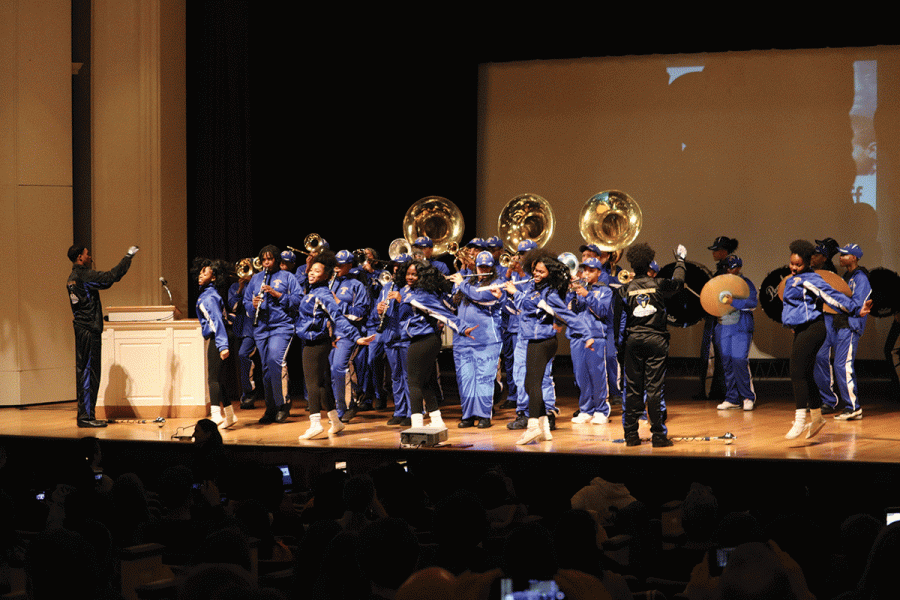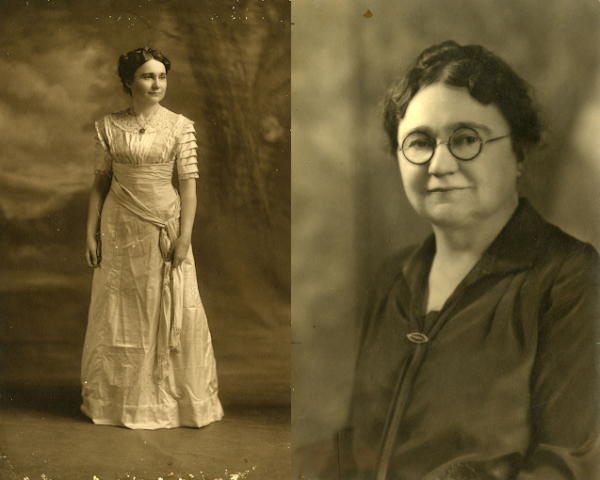Guilford BHM kickoff event honors culture
With a kickoff event featuring cultural performances, Guilford College started off Black History Month on a high note. On Feb. 7, students, staff and faculty gathered together in Dana Auditorium to celebrate the richness, resilience and diversity of black culture.
“I mean, it’s Black History Month, and to only have a month, you know it’s only right to be able to come to an event where we have all types of that culture,” said senior Alex Martin. “To have the bands to music to poetry, all the languages, man it’s beautiful, seeing everybody come together (to) learn the history about the first (people) that came from Africa.”
Since October, 15 students, staff and faculty of the Black History Month committee have met every Monday to plan Black History Month events. All of the events are designed and coordinated by students.
“I am really proud of the Black History Month committee and I think what makes me most proud is that most of the work was done by the students.” said Director of Community Learning James Shields. “I have been to a lot of these, and I think this is one of the first times we’ve had so much input from the students.
“(We’re) doing what the students wanted to do.”
The event, which lasted for about an hour and a half, featured seven performances honoring African-American and international culture. Zaynah Afada was the Master of Ceremonies. The James B. Dudley High School Pep Band began the kickoff with several pep anthems.
Shields gave the opening remarks. He spoke about the history of African-American students at Guilford, and called for the school to stand together as one community. The first major group of Black students was admitted to Guilford in 1968.
“They also created ways of support, brothers and sisters in blackness which is now our BSU,” said Shields. “We also know that the African-American students that came here in 1968 created one of the first ongoing service projects, called ‘Black Children Can.’ They came here understanding that they needed to give back.
“They came here understanding that they left others who needed that hand up, who needed tutoring, who needed mentoring.”
Senior Kimberleigh Crump performed “A Change Is Gonna Come” by Sam Cooke, a protest song written to support the civil rights movement. The song expresses the hardships that an African-American man must face in 1960s American society. He indicates that even though he has been struggling since he was “Born by the river in a little tent,” he is optimistic about the future and “a change is gonna come.”
Afada addressed the crowd, uniting attendees by asking them about their own struggles.
“I would like you guys to do an activity with me,” said Afada. “If the answer to this relates to you, you can stand up. How many of you have felt like your higher power had abandoned you?”
Many students stood up.
“How many of you had to fight to overcome challenges and obstacles?”
Most of the crowd stood up.
“How many of you had to fight for what you believe in?”
Almost everyone stood up.
Community poet Tracy Morrison read her poem, “Fight,” about having the will to keep going in the face of adversity.
“And when faced with the decision about whether or not to fight,” said Morrison. “We as a people, have no choice. We fight, till we can’t no more.”
First-year Nina Lama, sophomore Xinxin Zhou and junior Fujie Mei performed a dance to the Nepalese song, “Sun Khai Bhau.” Juniors Precious Adisa and Jemima Adisa sang “In Your Nest” in Yoruba and English.
Director of Student Leadership and Engagement Tim Johnson performed a mime act to a speech about following dreams and a song. He formulated gestures and expressions to convey the words in the speech and song, but did not make any sounds himself.
The event finished with an international parade. Students representing Nepal, Chad, Palestine, Nigeria, Japan, Sudan, Mexico and Burma read facts about Guilford or a personal story, in their country’s language while wearing the country’s traditional clothes.
Performers, such as Johnson, felt optimistic that the event would have a strong impact.
“So it’s a celebration of love and community,” said Johnson. “This right here is a celebration of what community can look like. If we continue to make strides in this effort, this is only a stepping stone, this is not the end all be all, so I think we should take this moment and keep progressing forward.”
Scholars have noted that Americans have a narrow view of black culture, and contributions. Black History Month gives African-Americans and people of color a chance to have their stories heard.
“Historically, people of color and minorities are often left out of the dominant narrative, or the master narrative,” said Director of the Multicultural Education Department Krishauna Hines-Gaither. “Our stories often times are not told, we’re not the face of history, of contributions, so I think this is so important, that people know our stories matter. Infused throughout the entire program was our history, as well as modern day. I think all of those things work together in concert.
“For the community, I think it’s so important that they start celebrating, and also acknowledging the contributions of all our community members.”









